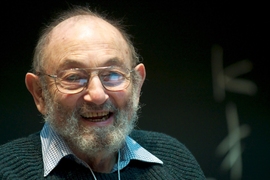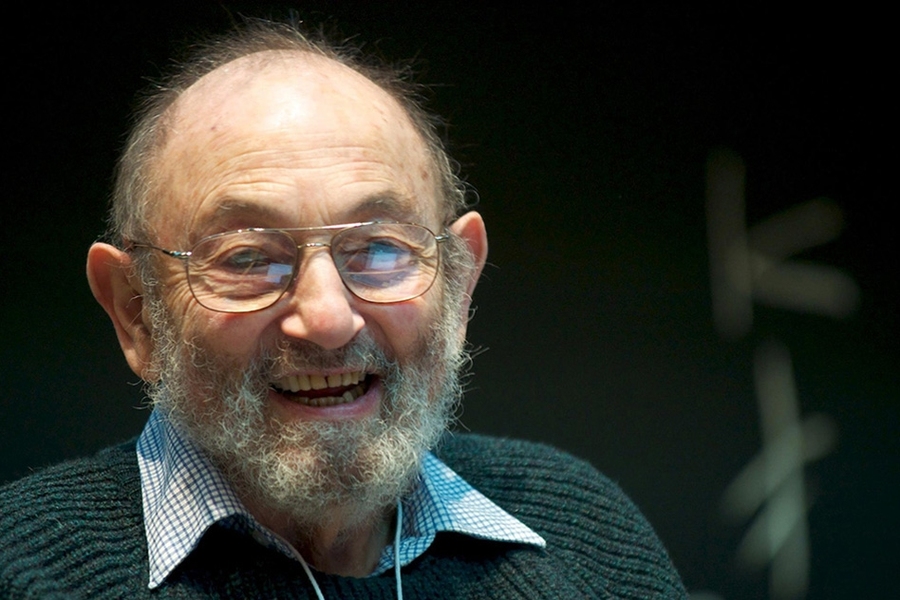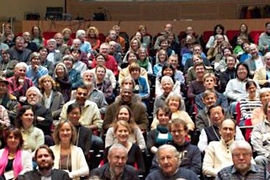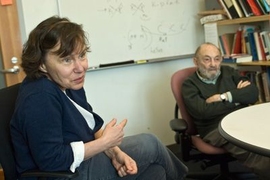Institute Professor Emeritus Morris Halle, one of the most accomplished and influential scholars in the field of linguistics, died of natural causes on Monday at age 94.
Halle was an expert in phonology, the structure of sounds in language. His wide-ranging work helped establish his own field as an important domain of research and helped systematize inquiry into the subject. Halle’s work was part of a revolution in linguistics that helped scholars understand human language as a phenomenon with a deep and universal structure, which stemmed from distinctive human faculties.
Beyond his own research, Halle helped found MIT’s renowned linguistics program and helped imbue it with its intellectual ethos, by encouraging meticulous research, a fruitful combination of empirical work and theory, and a spirit of collaborative, open-ended inquiry, which Halle exemplified throughout his own academic life.
Halle and Institute Professor Emeritus Noam Chomsky developed groundbreaking research together in the 1950s and 1960s — after Halle played a key role in bringing Chomsky to MIT in 1955. Together, Chomsky and Halle worked to specify the innate foundations dictating the structure of human language, extending Chomsky’s work on syntax into a rule-governed framework describing the sounds produced in English.
“Morris and I were very close for almost 70 years, working together, sharing much else,” Chomsky told MIT News in response to Halle’s death. “His contributions to modern linguistic science are incalculable, not least right here at MIT, where even apart from his groundbreaking work, he was primarily responsible for creating what quickly became, and has remained, the center of a research enterprise that has flourished all over the world, far beyond anything in the millennia of inquiry into language. [Halle was] a wise and compassionate person, more than anyone I’ve known, whose kindness, warmth, and care touched many lives.”
David Pesetsky, the head of the MIT Department of Linguistics and Philosophy, said Halle was a profoundly influential researcher and educator — and a touchstone for MIT linguists over his whole career.
“Morris was an epoch-defining figure in the history of modern linguistics — not only for his scientific contributions, which helped launch the modern era of our field, but also for his revolutionary approach to graduate education,” said Pesetsky, the Ferrari P. Ward Professor of Modern Languages and Linguistics.
Pesetsky added: “Here at MIT, Morris created a linguistics program unlike any other at the time, which involved students in the process of discovery from the very beginning, took their ideas and findings seriously, and demanded no less from the students themselves. This vision, a very MIT vision, is now everywhere in linguistics, but it was Morris's vision. But Morris was more than just the visionary father of our program and a model scientist. He was also the soul of our program, whom we loved and turned to for direction and advice as students and for years thereafter.”
Donca Steriade, the Class of 1941 Professor in the Department of Linguistics and Philosophy at MIT, and a former PhD student of Halle, heralded his commitment to teaching and the confidence he instilled in his students.
“What his former students remember more than Morris’ advice and ideas — wise and abundant as these were — is that he treated us as individually responsible for the future of our field,” Steriade said. “It really concentrates the mind to understand this, within weeks of landing at MIT. He saw his job as that of equipping us with a bit of background knowledge and making us appreciate some of the unsolved problems. The hope was that we would decide to solve them, and acquire an education in the process.”
Creating a department, making a revolution
Morris Halle was born in Latvia in 1923, in a Jewish family. His father, a businessman, moved his branch of the family to the United States in 1940, after Germany invaded Poland. However, other relatives of Halle did not emigrate, and only a small portion of Latvia’s Jewish population survived the Nazi occupation.
Halle first studied at the City College of New York, before entering the U.S. military and serving in France during World War II. Halle later downplayed his military efforts — “I just did what they told me,” he said to MIT News in 2010 — and returned to the U.S. to resume his education. After receiving a master’s degree in linguistics from the University of Chicago and then studying at Columbia University, Halle received his PhD in linguistics from Harvard under an eminent scholar, Roman Jakobson.
Among many other skills, Halle was a polyglot whose unusual fluency in languages extended to English, German, French, Russian, Latvian, Yiddish, and Hebrew. That facility helped Halle in 1951 earn a job at MIT teaching German and Russian, as the Institute did not have a formal department devoted to research and teaching in linguistics.
But Halle had an expansive vision for linguistics at MIT. He saw the possibilities for a full-fledged research department, one that could pursue work on innovative ideas. That vision started becoming a reality after Halle, who was conducting acoustic research of Russian at MIT’s Research Laboratory for Electronics (RLE), hired the scholar Carol Chomsky, who would later become a linguist at Harvard. As a result, Halle got to know her husband, Noam Chomsky.
In their first conversation, as Noam Chomsky recounted to MIT News in 2012, Halle and Chomsky “immediately had a big argument about something, and later I thought he had some good points.” Chomsky added: “Anyway, we very quickly became close friends.” Halle, Chomsky, and biologist Eric Lenneberg soon began an extended dialogue about their novel approach to linguistic explanation, and ultimately Chomsky joined the MIT faculty.
“In the summer of 1955, Chomsky, with whom I was friends, needed a job,” Halle told MIT News. “So I went to the department head and I said, ‘Why don’t we hire Chomsky?’”
It was a sound recommendation. Chomsky helped change linguistics with his concept of universal grammar, which holds that language is not simply acquired through social learning, but relies on an innate faculty — which in turn implies that all languages have common structures. Chomsky worked primarily on syntax, the principles underlying the organization of language, but Chomsky and Halle collaborated extensively to extend these concepts to phonology.
One result of the Chomsky-Halle partnership was their seminal 1968 book, “The Sound Pattern of English” — often simply called “SPE” — which systematically set out the rules that convert strings of abstract minimal units (known as phonemes) into uttered sounds, in English. According to this hypothesis, the path from mind to speech runs through a set of ordered rules, each one transforming its input in a specified way.
In the half-century since SPE appeared, alternate hypotheses have emerged to account for the formation of sounds in English. But the book has had immense influence, pushing the field forward by developing such a broad explanatory framework.
Halle’s work extended well beyond the general hypothesis presented in SPE. Among other things, Halle also conducted far-ranging research into the sound patterns of Russian. And in the 1990s, Halle also spent years developing another broad theoretical framework connecting syntax and sound, termed “distributed morphology,” which he created along with linguist Alec Marantz, among other contributors. This refinement outlined a set of operations through which morphemes, the smallest units of sound, are mobilized in the process of speech.
“Argue with me!”
Among Halle’s many characteristics as a scholar, one of the most enduring was his absolute belief that intellectual research and debate should occur on the basis of substantive insight, without regard to the formal academic hierarchy. Generations of students heard Halle utter a familiar phrase — “Argue with me!” — that served as an invitation for reasoned, empirical discussion.
That form of mentorship was powerful, and it sought to produce intellectual progress rather than rigid disciples. In the 2016 edition of the Annual Review of Linguistics, Mark Liberman, a professor of linguistics at the University of Pennsylvania, wrote that Halle, apart from his vast output of research, “has had an equally profound influence through his role as a teacher and mentor, and this personal influence has not been limited to students who follow closely in his intellectual and methodological footsteps. It has been just as strong — or stronger — among researchers who disagree with his specific ideas and even his general approach, or who work in entirely different subfields.”
In a 1974 lecture that Halle made before the members of the Linguistic Society of America, he characteristically declared that “the linguist must be prepared to lose as well as to win.” Asked about that declaration in 2010, Halle instantly quipped, “I was younger then.” However, he quickly added, “If you believe something, put your money where your mouth is, and 10 years later you will know if you were right or wrong. Nobody else will need to tell you when you’re whipped.”
Halle’s graduate students, by many accounts (including a large number compiled by Liberman in that same article) often found him daunting and exacting at first, but came to realize how invested Halle was in them, and how supportive he was as their work progressed.
“Soon after Morris founded MIT’s linguistics department,” Steriade said, “significant contributions to this research program were made by Morris’ and Noam’s students and colleagues, and then by their own hundreds of students and students’ students. Most phonologists active today trace their academic lineage, directly or indirectly, to Morris.”
Just last week, Steriade said, Halle told two former students, “We did some good teaching.”
Samuel Jay Keyser, an emeritus professor of linguistics who knew Halle for decades, on Monday paid tribute to Halle’s influential collaboration with Chomsky and his lifetime of good works on behalf of others.
“It is impossible to think of Morris Halle without thinking of Noam Chomsky,” Keyser observed. “These two individuals were the pillars upon which theoretical linguistics in the 20th century and beyond was built. They are responsible not only for the best linguistics department in the world, but for sending hundreds of students out into the world to try to do the same.”
Keyser recalled telling students that “Morris should be their role model. He is not superhuman, but he is as good as a human being can be. … He was my mentor, my role model, and my friend for over 50 years. Now, sad to say, one of the pillars has crumbled. It had to come. But that doesn’t make it any easier.”
For his part, Pesetsky summarized the centrality of Halle to MIT’s linguistics program, and the degree of respect his colleagues held for him, by reflecting on a large 50th anniversary celebration the linguistics department held in 2011, with multiple days of talks and events.
“When our program celebrated its 50th year in 2011, we had Morris's friend and lifelong co-conspirator Noam Chomsky as the final speaker on the second-to-last day of our celebration, but the final slot on the final day belonged to Morris,” Pesetsky said. “None of the several hundred alumni and colleagues in the room needed to be told why, and no other ending was ever discussed.”
Halle was married for 56 years to his wife Rosamond, who died in 2011. Halle is survived by his sons, David, John, and Tim, and his grandchildren, Casey, Ben, Cecilia, and Rosie. An MIT service honoring Halle is planned for Saturday, May 5.









